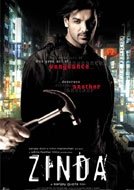
Sanjay Gupta’s movie ‘Zinda’ works primarily because of its gripping, although unoriginal, story and a noteworthy acting performance by its frontman Sanjay Dutt.
One thing Gupta certainly has an eye for is offbeat, hard-hitting stories. His movies ‘Kaante’ and ‘Musafir’ had stories that weren’t seen in Bollywood cinema. It is another thing that they were inspired from Hollywood flicks. But Gupta knows well how to give a good story a new garb, a new look, with a little bit of his own original inputs in the edgeways.
And let us not forget, cinematic stylization is Gupta’s forte. The camera angles, the tone of the film, the slick editing, fade-to-black shots – all this makes ‘Zinda’ a visually appealing movie. However, the bloodbath and slaughter that is unapologetically depicted in the second half may put some viewers off. It is authentic and repulsive at the same time.
Visually, ‘Zinda’ is a dark film. The tone and ambience of the movie is like a metaphor to the life of its protagonist, Balajit Roy (Sanjay Dutt).
A software engineer, Balajit came to Bangkok with his wife Nisha (Celina Jaitley). One fateful day, Balajit was abducted and put in solitary confinement. There is not a clue as to why he is held captive, or who his captor is.
Living, rather existing, in this black hole, Bala begs, curses and damns his captors. But all his pleas fail to change his fate. Bala’s only touch with the outside world is a TV set from which he comes to know that his wife has been murdered and he is the prime suspect.
Months turn into years. From within his cell, Bala sees the world outside change on the TV set. He resigns to his fate, but still nurtures a hope to find out answers to the questions that burn inside him – Why is he held captive? Who his captor is?
Then one day, after fourteen long years of incarceration, Bala is set free without any explanation. It is another riddle in his mind. A free man on the streets of Bangkok, Bala now has sole aim – to hunt down his captor.
In his search he takes the help of a cabbie named Jenny (Lara Dutta) and his friend (Mahesh Manjrekar).
Like a volcano waiting to explode, Bala drills, hammers and axes people to get close to his captor until the day he comes face to face with the man – a businessman named Rohit Chopra (John Abraham).
‘Zinda’ is inspired from the Korean film ‘Oldboy’. But it is not a dumb copy. Gupta must be commended for the way he has presented the story. Right from the initial reels, the movie grips you. The sequences showing Dutt in confinement, the torment and gradual transition he undergoes in this black hole, keeps a viewer glued to the screen. Allusions to the story’s mysteries are planted evenly throughout this half, but things become clear only at the fag end, like many pieces of a jigsaw puzzle falling in place.
Sanjay Dutt deserves all praise for a performance that shows his range as an actor. For the major part of the first half, he is disheveled, tormented, persecuted and vulnerable. In the second half, he breathes fire, breaks bones and spills blood.
Celina Jaitley has a mere five-minute role. Lara Dutta acquits herself well playing the cabbie, while Mahesh Manjrekar overacts.
John Abraham looks suave and dandy, but is not able to portray the intensity that his character needed.
In a nutshell, ‘Zinda’ is a finely made movie with a story that throws unexpected twists just when the going seems to get smooth. The movie has two songs (Yeh Hai Meri Kahani by Strings and Zinda Hoon Main by Shibani Kashyap), but they play in the background.
The second half of the movie is morbidly violent and gory. It is raw, rugged and in-your-face. Those who can stand this would find the movie worth watching once at least.